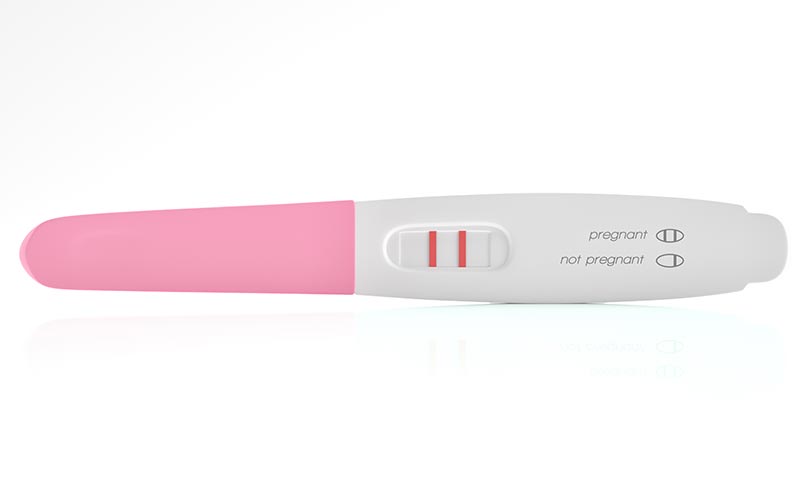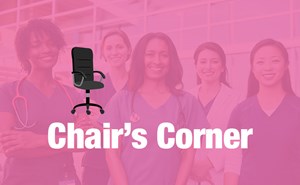
The Pregnant Intern
It’s July 1st of intern year. I quickly hopped in the shower before heading to our EMR training. I realized I had a couple minutes to spare, so I decided to take the 10,000th pregnancy test since we started trying for a baby. Several minutes passed while I finished getting ready, then I glanced down. Could it be? Is that a second line? HOLY CRAP THERE ARE TWO LINES. I’m pregnant? I’m pregnant! I had a thousand ways to “tell” my husband, who was a senior EM resident in the same program. Suddenly, the cutesy announcement seemed stupid. I HAD to know if he could see both lines too. I ran into the bedroom and woke him from a deep sleep after a late-night shift. He woke up confused, then looked at the test and pulled me in for the biggest hug. We were about to become parents together.
We decided to wait the full 12 weeks to share our big news... until two hours later when I blurted out “THERE WERE TWO LINES” to my new co-resident. By lunch time, I spilled the beans to the whole class. Anyone that knows me was not surprised by my inability to keep the excitement to myself.
Then it set in. I’m a brand new resident. I know nothing. I’m going through one of the biggest career transitions in my life and now I’m going to be a mom? And my husband is a resident too? And our WHOLE family is halfway across the country? We knew we were in for quite an adventure.
How did you tell your program and discuss maternity leave?
It didn’t take long for me to tell my program leadership. Everyone was incredibly supportive and their genuine excitement was palpable. Thankfully, my mentor had been in my exact same shoes several years earlier and she had the smartest, sweetest, most adorable daughter that I had ever met, so I had confidence that it was possible. But when it came time to discuss maternity leave, I was faced with a choice. I could take maternity leave for up to 12 weeks (and was encouraged to do so if I desired), but anything over 3 weeks (in addition to my 3 vacations) would have to be made up after graduation per ABEM requirements. I remember thinking that it was a very fair system at the time, but there was one caveat. If I desired to pursue an accredited fellowship that started on July 1st after my residency graduation, I would be ineligible to apply until the following year. It felt too early to “know” whether I wanted to do academics or not, but I knew that I needed more time with my new baby. I knew that 6 weeks without any other break during intern year was a recipe for postpartum depression and burnout. I chose to take 8 weeks with my son and keep my 3 regular vacations to spread throughout the year. I felt confident that this choice would allow me to be the best, most dedicated resident throughout the year, while also being able to focus on my family.
What was it like to be a pregnant resident and now a mom?
After several near syncopal episodes in the Burn operating room and Trauma Bay, it became clear that pregnancy and intern year were not synergistic. Being stealth was impossible with my gigantic belly. I once had to crawl on the floor to escape from behind a C-arm so that I could waddle my way to a code. On anesthesia, my son actually kicked a patient in the head while I intubated her. Nothing was graceful, but somehow it worked.
Nolan is now almost 2 years old and I’m in my last year of residency. The “long days, short years” saying couldn’t be more true. Residency has been hard, but becoming a mom has been harder. My days out of the hospital are more exhausting than any brutal ED shift, but I wouldn’t trade it for the world. I may have missed his first steps, but my ICU attending stopped rounds so that we could all watch the video when my phone went off that day. I cried and my attending teared up with me. That’s when I realized that I was surrounded by family at home and in the hospital. I honestly don’t know many people that can say that about their careers.
Being a mom throughout residency has provided a sense of balance and big picture perspective that I never would have been able to see on my own. I am a more calm person at home and at work now that I have Nolan in my life. When people ask me what it’s like to have a child during residency, my response is “It’s better”.
How did maternity leave affect your graduation? What is “The Newborn Experience” elective that you created at the University of Iowa?
If I could go back in time, I would choose the same maternity leave structure again and again, but it really bothered me that my choice affected my fellowship options and future career trajectory. My 8 weeks at home were more valuable to my development as a physician than any other 8 week block of residency.
We, as emergency physicians, face post-postpartum and neonatal emergencies every day. We regularly give advice on breastfeeding and infant safety. But how do nonparent residents really know this stuff? Even if learned in a book, nothing compares to living it. I never realized what answers I was searching for when I asked for the amount of wet diapers and feeding schedules of a febrile infant before I had my son. I couldn’t have possibly understood the pain of mastitis before crying it out in my shower after a
long shift. How could I have gained all of this knowledge that allowed me to become a better doctor, yet not received any credit for it during my training? Furthermore, how could this amazing experience derail my ability to meet the rigid requirements for pursuing a fellowship?
Lucky for me, I fell in love with community medicine and am so excited for my upcoming career in Minneapolis. But what about future residents? I couldn’t get this idea out of my head. My mama bear instincts kicked in and I knew I had to do something. I knew I had to fight for those behind me. So I did.
I researched elective curriculums for family medicine, internal medicine and pediatric programs nationwide. I found numerous “parenting electives” but never came across one in an emergency medicine program. How could this be? We are in the unique position where we deal with ALL age groups in an acute setting. We provide care when parents are most desperate.
With that, “The Newborn Experience” elective was born. We are happy to say this is an all inclusive 4-week elective that is open to all residents who are able to provide 40+ hours a week of direct infant care (non-parents included). The curriculum includes the latest evidence based medicine recommendations for post-postpartum and neonatal care. Residents attend meetings with lactation consultants, the fire department and local support agencies so they gain first hand experience with the resources that our
community offers. Not only does this open the doors for women to keep their graduation date on track, but it also allows men the same opportunity and the chance to bond with their new child for a full 4 weeks instead of the previously allowed 5 days. Our program is confident that this will provide increased wellness to our residents while making them stronger physicians by the time they graduate.
Special Thanks: My husband, Nick Philpot. Despite being an EM physician himself, he has pulled about 80% of the household and parenting work since our son was born. He’s an incredible role model and has been such a support for my own mental and physical health while juggling this thing called life. When I was ready to give up pumping after sitting in a storage closet halfway through a shift, he used his first “attending paycheck” to donate an entirely new pump room setup. It is now fully decked out with decor, candy, water bottles and a mini fridge for all EM mothers to store their milk in during their busy shifts. My mentor and friend, Emilie Fowlkes. She pioneered her way through intern year and pregnancy back in 2012 while her husband also endured an ENT residency. She paved the way so that I had proof that it was possible before my journey even started. She walked me through the ups and downs of pregnancy that NO ONE prepares you for. I will always be grateful for the positive impact that she had on my road to becoming a doctor mom.
Brittany Philpot, MD
PGY-3, University of Iowa



